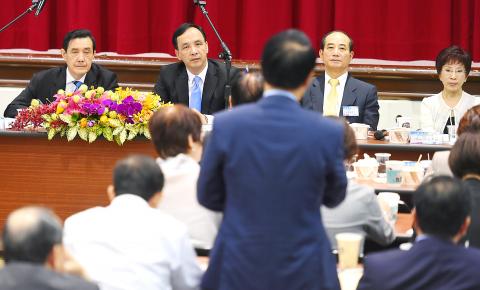The Chinese Nationalist Party (KMT) government will prioritize passage of a cross-strait agreement on double taxation avoidance as well as bills on the budget, government restructuring and an all-volunteer military in the fall legislative session, Premier Mao Chi-kuo (毛治國) said yesterday.
Mao said the Cabinet would also push a special budget bill to finance a river basin management plan, an amendment to encourage small and medium-sized enterprises to raise wages for their employees and legislation promoting industrial innovation.
He listed the government’s priorities at a forum held by the KMT’s Policy Committee to discuss the legislature’s operations and coordination with the government before the new session begins today.

Photo: Chang Chia-ming, Taipei Times
President Ma Ying-jeou (馬英九), Legislative Speaker Wang Jin-pyng (王金平), KMT Chairman Eric Chu (朱立倫) and Deputy Legislative Speaker Hung Hsiu-chu (洪秀柱), who is the party’s presidential candidate, were all present at the forum.
Among the government’s top priorities is the ratification of an agreement between Taiwan and China that aims to protect Taiwanese businesses with operations in China from paying taxes on the same income on both sides of the Taiwan Strait.
The double taxation avoidance agreement was signed last month by Taiwan’s Straits Exchange Foundation Chairman Lin Join-sane (林中森) and China’s Association for Relations Across the Taiwan Straits Chairman Chen Deming (陳德銘) on behalf of their respective governments.
Ministry of Finance officials last month said that the pact would reduce the tax burden of Taiwanese companies and also offer an incentive for foreign companies to set up operations in Taiwan.
Meanwhile, KMT lawmakers at the forum called on party heavyweights to improve cooperation and solidarity before the January presidential and legislative elections, to avoid putting the party’s chances at risk.
KMT Legislator Lin Yu-fang (林郁方) said that despite the Democratic Progressive Party’s internal bickering, it at least presented a united front during elections.
On the other hand, polling revealed that no one believes the KMT has the same willingness to maintain solidarity, he said.
“Legislators are often the ones sacrificed, because our party’s heavyweights cannot work together,” Lin said, adding that he hoped the KMT’s principals would be able to talk things out.
The president said he fully supported the idea and would “do everything in my power, wherever I am needed.”
Chu said solidarity was important, adding that everyone at the forum was considered a “member of the upper echelon of the party.”
“We must work together in order for our 880,000 members to be united in purpose,” Chu said, adding that only then would the party get the support it needs.
Wang said coordinated efforts by the Cabinet, the legislature and the KMT to push the bills through would be very helpful to the party’s chances in the January polls.

TRAGEDY STRIKES TAIPEI: The suspect died after falling off a building after he threw smoke grenades into Taipei Main Station and went on a killing spree in Zhongshan A 27-year-old suspect allegedly threw smoke grenades in Taipei Main Station and then proceeded to Zhongshan MRT Station in a random killing spree that resulted in the death of the suspect and two other civilians, and seven injured, including one in critical condition, as of press time last night. The suspect, identified as a man surnamed Chang Wen (張文), allegedly began the attack at Taipei Main Station, the Taipei Fire Department said, adding that it received a report at 5:24pm that smoke grenades had been thrown in the station. One man in his 50s was rushed to hospital after a cardiac arrest

A car bomb killed a senior Russian general in southern Moscow yesterday morning, the latest high-profile army figure to be blown up in a blast that came just hours after Russian and Ukrainian delegates held separate talks in Miami on a plan to end the war. Kyiv has not commented on the incident, but Russian investigators said they were probing whether the blast was “linked” to “Ukrainian special forces.” The attack was similar to other assassinations of generals and pro-war figures that have either been claimed, or are widely believed to have been orchestrated, by Ukraine. Russian Lieutenant General Fanil Sarvarov, 56, head

SAFETY FIRST: Double the number of police were deployed at the Taipei Marathon, while other cities released plans to bolster public event safety Authorities across Taiwan have stepped up security measures ahead of Christmas and New Year events, following a knife and smoke bomb attack in Taipei on Friday that left four people dead and 11 injured. In a bid to prevent potential copycat incidents, police deployments have been expanded for large gatherings, transport hubs, and other crowded public spaces, according to official statements from police and city authorities. Taipei Mayor Chiang Wan-an (蔣萬安) said the city has “comprehensively raised security readiness” in crowded areas, increased police deployments with armed officers, and intensified patrols during weekends and nighttime hours. For large-scale events, security checkpoints and explosives

PUBLIC SAFETY: The premier said that security would be tightened in transport hubs, while President Lai commended the public for their bravery The government is to deploy more police, including rapid response units, in crowded public areas to ensure a swift response to any threats, President William Lai (賴清德) said yesterday after a knife attack killed three people and injured 11 in Taipei the previous day. Lai made the remarks following a briefing by the National Police Agency on the progress of the investigation, saying that the attack underscored the importance of cooperation in public security between the central and local governments. The attack unfolded in the early evening on Friday around Taipei Main Station’s M7 exit and later near the Taipei MRT’s Zhongshan